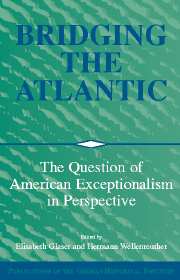Book contents
- Frontmatter
- Introduction
- Part One Transatlantic Faiths and Beliefs
- Part Two Transatlanatic Ideologies and the Perception of the Other
- 3 The Role of Religion in Germany and America in the Nineteenth and Twentieth Centuries
- 4 The Impact of Darwinism on Religion and Science in America and Europe During the Nineteenth Century
- 5 Nationalism as a Civil Religion in the Thought of Abraham Lincoln, Carl Schurz, and Otto von Bismarck
- Part Three People in the Transatlantic World The Perception fo Self
- Part Four Transatlantic Politics and Economics
- Part Five Transatlantic History and American Exceptionalism
- Index
4 - The Impact of Darwinism on Religion and Science in America and Europe During the Nineteenth Century
Published online by Cambridge University Press: 05 January 2013
- Frontmatter
- Introduction
- Part One Transatlantic Faiths and Beliefs
- Part Two Transatlanatic Ideologies and the Perception of the Other
- 3 The Role of Religion in Germany and America in the Nineteenth and Twentieth Centuries
- 4 The Impact of Darwinism on Religion and Science in America and Europe During the Nineteenth Century
- 5 Nationalism as a Civil Religion in the Thought of Abraham Lincoln, Carl Schurz, and Otto von Bismarck
- Part Three People in the Transatlantic World The Perception fo Self
- Part Four Transatlantic Politics and Economics
- Part Five Transatlantic History and American Exceptionalism
- Index
Summary
Undoubtedly the best-known instance of the conflicted relationship between Darwinism and religion is the encounter in 1860 between Thomas Huxley, Charles Darwin's vaunted “bulldog,” and Samuel Wilberforce, the Anglican bishop of Oxford. As we all remember, it was “Soapy Sam's” supercilious inquiry into which of Huxley's ancestors derived from apes that drew from Huxley the famous reprise that apish ancestry was far superior to the ignorance the bishop's remarks had exposed. The encounter, in short, was perceived not only as a triumph of Darwinism over ignorance in the guise of religion but also the first of many such biting encounters over the remainder of the century.
Enduring as that vignette appears, it is a serious mistake to epitomize that incident as a true measure of the century's debate between Darwinism and religion, just as it incorrectly implies the scientific triumph of Darwinism. For one thing, some observers, like local news reporters, did not notice the incident at all, whereas others mentioned Joseph Hooker's response to Wilberforce as more important than Huxley's. As a recent historian of the encounter makes evident, Wilberforce was no ignoramus or general critic of science. Indeed, in an extended review of The Origin of Species at that time, Wilberforce told his readers that he was basing his judgment “solely on scientific grounds.” For it was his “fixed conviction” that this was the only way by which “the truth or falsehood of such arguments should be tried.”
- Type
- Chapter
- Information
- Bridging the AtlanticThe Question of American Exceptionalism in Perspective, pp. 83 - 102Publisher: Cambridge University PressPrint publication year: 2002



